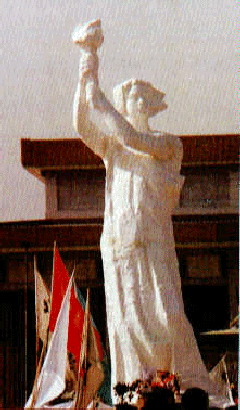Shortly after the Orange Revolution began in Ukraine, the Chinese Government began blocking the English language Google news site. PolitInfo.com reports:
Press freedom advocates are condemning China's move to block access to the English-language news site of the popular Web search engine, Google. Google came under criticism from press freedom advocates months ago when it established its Chinese-language edition and agreed not to list news stories the Chinese government deemed unacceptable.
Advocates accused the U.S. company of self-censorship for the sake of maintaining a stake in China's Internet market, which some experts say is growing at a rate of about 50 percent a year.
China's Internet market, which some experts say is growing at a rate of about 50 percent a year.
While Google's Chinese-language news Web site did not list banned stories, Chinese Internet users often could view prohibited material by going through Google's English-language site. There they could at least glimpse the headlines of blocked stories. In recent days, that changed.
There has been some speculation that the Chinese do not wish their citizens to have access to information about recent events in Ukraine. Marlowe Hood of Agence France Presse comments the information blockade:
If the spectacle of Ukraine's unfolding drama scares Chinese leaders, it is not as an object lesson on "how to split up a country," as Fons Tuinstra suggests, but because of the echo with June 4, 1989. For anyone -- Chinese or non-Chinese -- who witnessed the before and after of that traumatic event (I did so as a reporter for the South China Morning Post), the sight of hundreds of thousands of people protesting peacefully against corruption in the streets of a capital city is, well, highly evocative. The parallel goes even deeper: Just as an ostensibly retired Deng Xiaoping ruled China and hand-pick its top leaders, so did Ukraine's Leonid D. Kuchma anoint Viktor F. Yanukovich as his successor. But what frightens the leadership in China more than the similarities is the contrast: Yanukovich (and, presumably Kuchma)have stepped back (at least for now) from what could have been a terrible and violent confrontation, opening the way to new elections and the possibility of peaceful reform. In China, Deng purged the Communist Party's top official (Zhao Ziyang) because he was inclined to negotiate with protesting citizens, and then he called in the tanks. Ukraine shows what many Chinese think: things could have turned out differently in Beijing.
Shame on Google for adapting to China's censorship. What is happening in Ukraine today is inspirational. It provides hope for others under totalitarianism's boot. Freedom is contagious as we saw again today in Minsk. At 15:30, in the center of town, on animated Nemiga street, Belorusian activists hung an 8 meter sign with the words: “Today Ukraine tomorrow Belarus!” Hundreds of pedestrians and drivers saw it. No doubt the Chinese don't want a similar sign in Tiananmen Square.
It provides hope for others under totalitarianism's boot. Freedom is contagious as we saw again today in Minsk. At 15:30, in the center of town, on animated Nemiga street, Belorusian activists hung an 8 meter sign with the words: “Today Ukraine tomorrow Belarus!” Hundreds of pedestrians and drivers saw it. No doubt the Chinese don't want a similar sign in Tiananmen Square.
 It provides hope for others under totalitarianism's boot. Freedom is contagious as we saw again today in Minsk. At 15:30, in the center of town, on animated Nemiga street, Belorusian activists hung an 8 meter sign with the words: “Today Ukraine tomorrow Belarus!” Hundreds of pedestrians and drivers saw it. No doubt the Chinese don't want a similar sign in Tiananmen Square.
It provides hope for others under totalitarianism's boot. Freedom is contagious as we saw again today in Minsk. At 15:30, in the center of town, on animated Nemiga street, Belorusian activists hung an 8 meter sign with the words: “Today Ukraine tomorrow Belarus!” Hundreds of pedestrians and drivers saw it. No doubt the Chinese don't want a similar sign in Tiananmen Square. China's Internet market, which some experts say is growing at a rate of about 50 percent a year.
China's Internet market, which some experts say is growing at a rate of about 50 percent a year.










3 Comments:
On Google BB sites having to do with Ukraine, there were messages of support from people in China and Hong Kong, in the days following Nov. 31.
That's very interesting. Though the filtered Chinese version did allow for viewing of English language headlines. It's only later that even this was blocked.
I'm curious, how long did the postings go on?
putting to waste some good money that could have been used in other areas of development for the business involved.
Post a Comment
<< Home